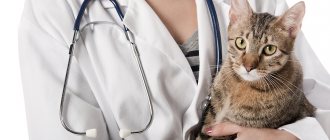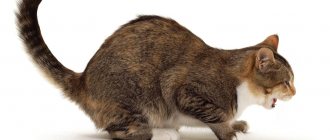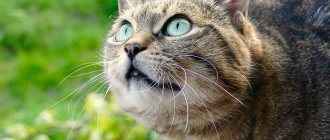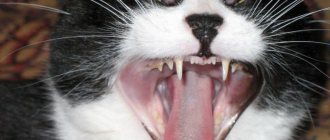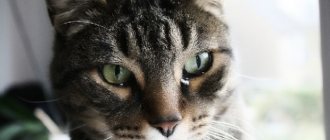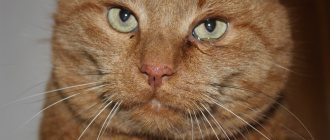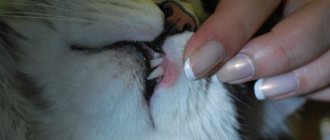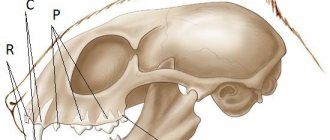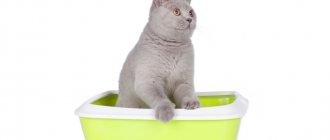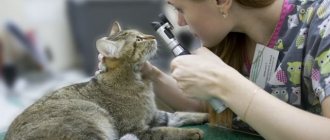7847Pavel
1
The cat family is distinguished by its amazing vitality and intelligence, acquired in the process of evolution and centuries of life next to humans. However, a pet's body is also susceptible to destructive effects when the cat bleeds from the mouth.
Today we will talk about this phenomenon with maximum care, consider the causes of its occurrence, treatment and preventive measures.
© shutterstock
What to do if your cat is bleeding from the mouth?
The cat family is distinguished by its amazing vitality and intelligence, acquired in the process of evolution and centuries of life next to humans. However, a pet's body is also susceptible to destructive effects when the cat bleeds from the mouth.
Today we will talk about this phenomenon with maximum care, consider the causes of its occurrence, treatment and preventive measures.
What not to do!
Many animal owners do not consider it necessary to go to the veterinary clinic, relying on the action of folk remedies. There are cases of animals self-medicating with medications for humans. Many of them end in the death of the unfortunate animal, exhausted by the disease and similar treatment. If you don't know the cause of your cat's illness:
- do not give your cat alcohol-containing drinks (vodka, moonshine, diluted alcohol);
- do not treat the animal with medicines for humans;
- do not use decoctions of medicinal herbs - many of them are simply poison for the animal.
Fundamental Concepts
If your pet is bleeding from the mouth, examine him, paying attention to:
- structure and condition of teeth and gums;
- possible damage to the lips;
- the color of the blood and its amount;
- presence/absence of odor, vomiting;
- general condition of the body: eating pattern, level of physical activity, muscle tone, thirst or dehydration.
Deviation from the norm in a cat of some indicators indicates the development of an unidentified disease. We strongly recommend that you seek qualified assistance on the same day.
Features of internal bleeding
Internal bleeding is the release of blood from damaged vessels into the body: into the abdominal or pleural cavity, into the space between muscles, into subcutaneous tissue, as well as inside hollow organs, for example, into the bladder, trachea or stomach.
The degree of danger to the pet's life depends on the rate of bleeding. With chronic, relatively small blood losses, oxygen starvation of the body tissues begins, anemia develops, metabolic processes are disrupted, which entails cell death. The animal’s activity decreases, the quality of its fur deteriorates, and the pet loses weight to the point of anorexia. In rare cases, lethargy develops.
Bleeding may stop due to the formation of clots that block the breakthrough, and then resume again due to their displacement. In this case, periods of weakness in the animal will alternate with normal health.
A blood clot can block a damaged vessel, but this improvement will only be temporary
With severe internal bleeding, the cat can die both due to a drop in pressure and oxygen starvation, and due to blood squeezing vital organs, such as the heart or brain. Without qualified assistance, death in this case occurs within a few hours or minutes, depending on the type of injury.
Why is this happening
It is quite difficult to discover the causes of an unknown disease, so we will divide the further narrative into several blocks.
Injuries to the oral cavity
Drip bleeding from the mouth occurs when the surface of the head is damaged (due to “showdowns” with competitors), sensitive walls (consumption of malignant products or objects of unknown origin).
If your cat is bleeding from the mouth, pay attention to:
- Color – shades of red or pink, depending on the degree of dilution.
- Duration - with minor injuries, blood stops flowing within ten minutes, tooth loss is accompanied by a longer period.
- The nature of the leak - liquid flowing out in jerks, indicates damage to an important vessel or large capillary of the facial area of the head.
To stop bleeding from the mouth, you will need cotton swabs treated with a manganese solution. If first aid does not bring results, contact specialized institutions.
Lung damage
If the respiratory system is affected, periodic foam from the cat's mouth mixed with pink blood is observed. The phenomenon is characterized by a small amount of fluid and no coagulation. If you notice such symptoms, immediately take your cat to a veterinary clinic.
Poisoning with toxic substances
After examining the cat's vomit, we can draw a conclusion about the nature of the ongoing disease. The presence of brown impurities indicates damage to the gastric mucosa. Often occurs due to: eating household chemicals, specialized mixtures.
If the cat has eaten rat bait, additional vitamin K injections and blood transfusions and rinsing by probing will be needed.
It is important to know! Do not induce vomiting if your cat eats toxic substances. A hasty decision can cause damage to the esophagus and respiratory organs from the moving masses.
Blood and liver damage
Problems with blood clotting indicate a destructive effect on the above-mentioned organs of the cat. Often occur during exacerbations of non-contagious diseases, and are not accompanied by the release of foam.
We recommend that you contact a veterinary clinic to submit biochemical analysis materials, a coagulogram and undergo highly targeted treatment.
Bleeding in the stomach
Vomiting blood in a cat is a sign of damage to the sensitive walls of the stomach. The discharge has a brown tint and an unpleasant smell, and the consistency resembles the thick of infused tea.
The frequency of exacerbation depends on individual characteristics, degree and nature.
An exacerbation is accompanied by sharp pain in the abdominal area, which can be relieved by eating several pieces of ice and applying cold compresses to the affected area.
It is important to know!
Blood flowing out of the mouth in a stream is a clear sign of “holes” in the vessels of the abdominal cavity or stomach . The question arises, what to do? The answer is extremely short - seek help from a veterinary clinic.
Main reasons
Bleeding due to mechanical damage
When a cat suddenly starts bleeding from the mouth, this may indicate an injury of varying severity. Domestic and street felines often damage their eyes and oral cavity with branches, sticks and other foreign objects. Also, such a violation can be a consequence of a fight with competitors or a consequence of eating bones and other solid foods. If bleeding in the mouth area is associated with mechanical damage, then pay attention to the following features shown in the table:
| Options | Description |
| Blood color | Red or pinkish |
| The color of a cat's blood coming out of its mouth depends on the degree of dilution. | |
| Duration of bleeding | With minor damage, bleeding stops after 10 minutes. |
| When the problem is caused by tooth loss, the duration is longer | |
| Character of bloody discharge | If there is a jerky discharge of fluid, you need to contact a veterinarian, as this indicates damage to a vessel or large capillary |
Experts note that in order to quickly stop the discharge of blood from the cat’s mouth, it is necessary to treat the wounds with cotton swabs with a solution of potassium permanganate.
Blood and liver pathologies
Sudden bleeding from a cat's mouth is a consequence of serious liver diseases and abnormalities of the hematopoietic system. When clotting is impaired, destructive processes occur, as a result of which liver function is disrupted. Often, such manifestations are a sign of an exacerbation of some non-contagious disease, in which foam does not come out of the mouth. It is impossible to cope with the problem on your own, so it is recommended to urgently contact a veterinary clinic.
Bleeding in the lungs: why does it happen?
When a cat is bleeding from the mouth, you should consult a doctor and have your pet examined for the presence of pulmonary pathologies. With such diseases, the animal develops foamy discharge with pink bloody impurities. Lung disorders are characterized by a scanty amount of blood, and it does not clot. In the case of such diseases, you should not self-medicate, but it is important to urgently take the cat to the doctor so that it does not die prematurely.
Stomach problems
If a cat is bleeding from the mouth, this is a signal of internal bleeding in the gastrointestinal tract. With this pathology, the pet often vomits bloody clots, and the disorder causes severe pain in the abdominal area. To eliminate the problem, the cat needs to be allowed to swallow several ice cubes, and a cold compress is applied to the peritoneum. A serious disorder is damage to the choroid plexuses of the esophagus, which is accompanied by the flow of scarlet or cherry blood from the cat’s mouth.
The effect of toxic components on the cat's body
Owners of kittens and adult felines need to carefully examine the discharge from the oral cavity, the nature of which can determine the disorder. When a cat starts bleeding brown from the mouth, this may be the cause of injury to the gastric mucosa. A similar condition occurs when using the following substances:
- household chemicals;
- specialized mixtures for baiting rats and other parasites.
Veterinarians focus the attention of cat owners on the fact that animals do not need to induce vomiting when poisoned by toxins. Such actions provoke damage to the esophagus and respiratory organs from poisoned vomit.
Blood from a cat’s mouth - what does this terrible symptom indicate?
Over the years, the cat family has evolved, which has led to the maximum survivability of cats. But even in modern times, animals can be subjected to various negative processes, in which a lot of unpleasant and life-threatening symptoms are observed. One of the severe processes is a condition in which bleeding comes from the cat’s mouth. A caring owner should know why a four-legged friend may bleed and how to prevent serious consequences.
Symptomatic treatment
If nasal discharge interferes with the animal’s full life, increases and changes in composition, then the cat must be shown to a doctor.
The veterinarian will assess the animal's condition. To make a more accurate diagnosis, the specialist will assess the cat’s general condition and well-being. He will also appreciate:
- the nature of the discharge (when it is more frequent, when, on the contrary, there is practically no discharge, whether the intensity of the discharge is affected by the activity of the animal, in what position of the body the flow from the nose is especially strong);
- abundance of discharge;
- does the discharge dry out and form crusts, or does the nose remain wet most of the time;
- is there snoring, sniffling, how much does the cat’s discharge bother him?
- where the discharge is localized: in both nostrils or only in one;
- Does the cat breathe through its nose while sleeping?
- how much the animal’s behavior changed when a runny nose appeared.
In accordance with the diagnosis, the specialist will prescribe treatment. It is important not to self-medicate and follow the doctor’s recommendations. It is also necessary to properly care for the animal’s sore nose, clean it of mucus, pus and crusts as carefully as possible so as not to damage the nasal passages.
So, in case of allergic reactions, it is not necessary to clean your nose of clear mucus. Veterinarians prescribe antihistamines, but they will only be effective if the allergen has been eliminated.
For rhinitis, the nose is washed with a 1% zinc sulfate solution or saline solution. You can warm your nose with bags of cereal heated in a frying pan.
For infections, it is important to correctly identify the pathogen and select the appropriate antibacterial, antiviral or antifungal drug. As a rule, relief occurs after 2-3 uses of the medicine.
If the animal’s nose is stuffy and it’s hard for him to breathe, then vasoconstrictor drops are used. But you should not abuse them - such drops are addictive. Drops are selected in children's dosage.
We recommend reading: Signs of Sarcoptic Mange in a Puppy
For tumors and polyps, doctors consider surgery. It is important to assess the depth of the tumor, the general condition of the animal, and concomitant diseases.
But it is worth remembering that if a foreign body gets into the cat’s nose, you cannot remove it yourself using cotton swabs or tweezers. This can push the object even deeper into the nostril and injure the mucous membrane!
Proper examination of the animal
The first thing the owner of a furry cat should do is to carefully examine the oral cavity of the cat, as well as the entire body of the pet. During the inspection, you need to pay attention to the following aspects:
- condition and structure of all teeth and gums;
- assess the integrity of the tissues of the cheeks and lips, both internally and externally;
- the color of the blood and the location of its flow;
- determine whether your pet has the urge to vomit;
- presence of fetid odor of bloody discharge.
Along with the above points, you should remember what was in the pet’s diet, what food it ate, and whether there were situations where the animal could have been injured. It is also very important to assess for dehydration. If the cat has not drunk for a long time due to the injury, then you should give some water by pouring it through a syringe without a needle. Dehydration of the body is fatal. It should be remembered that cats have metabolic processes much faster than humans, so dehydration is very dangerous. During the examination, the general condition of the animal is also assessed, the presence or absence of muscle spasms and convulsions is determined.
Prevention
It is not possible to protect your pet from all diseases. But it is possible to minimize the risks of developing a dangerous symptom. To do this, it is important to regularly inspect the cat’s mouth for damage to the teeth and mucous membranes, and to monitor the little kitten so that it does not pick up various objects and play with them. Even adult cats can swallow a needle or small ball, which can subsequently injure the digestive tract and cause bloody vomiting.
Do not forget about regular preventive examinations of the animal once every six months. This will allow timely diagnosis of diseases of internal organs and take measures to eliminate the pathology.
It is worth taking care of proper, balanced nutrition. Attentive attention to your pet’s condition will make it possible to promptly see changes in its behavior.
Do you want to know more about the article or something? Call +79774692712, we will advise you.
